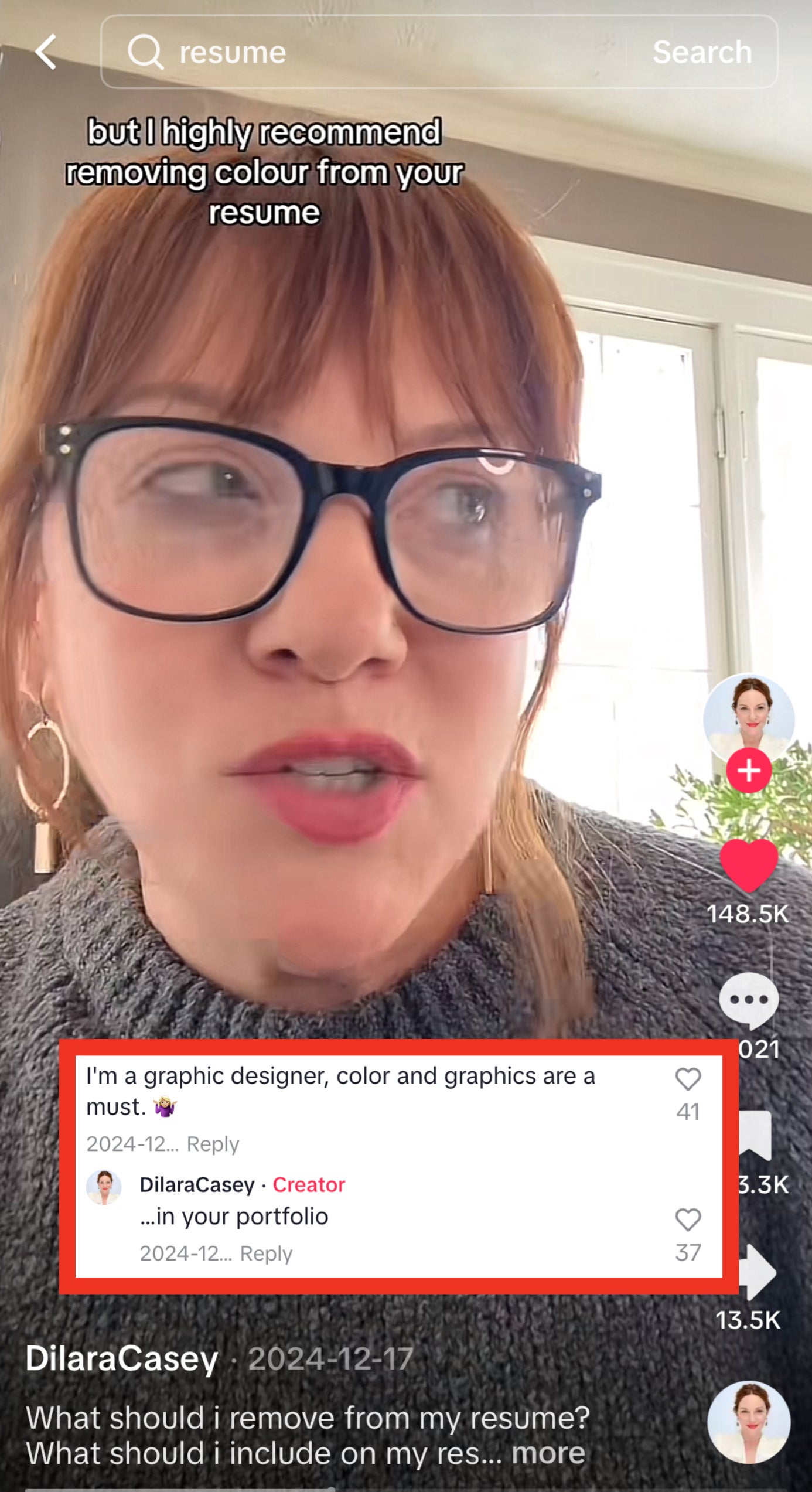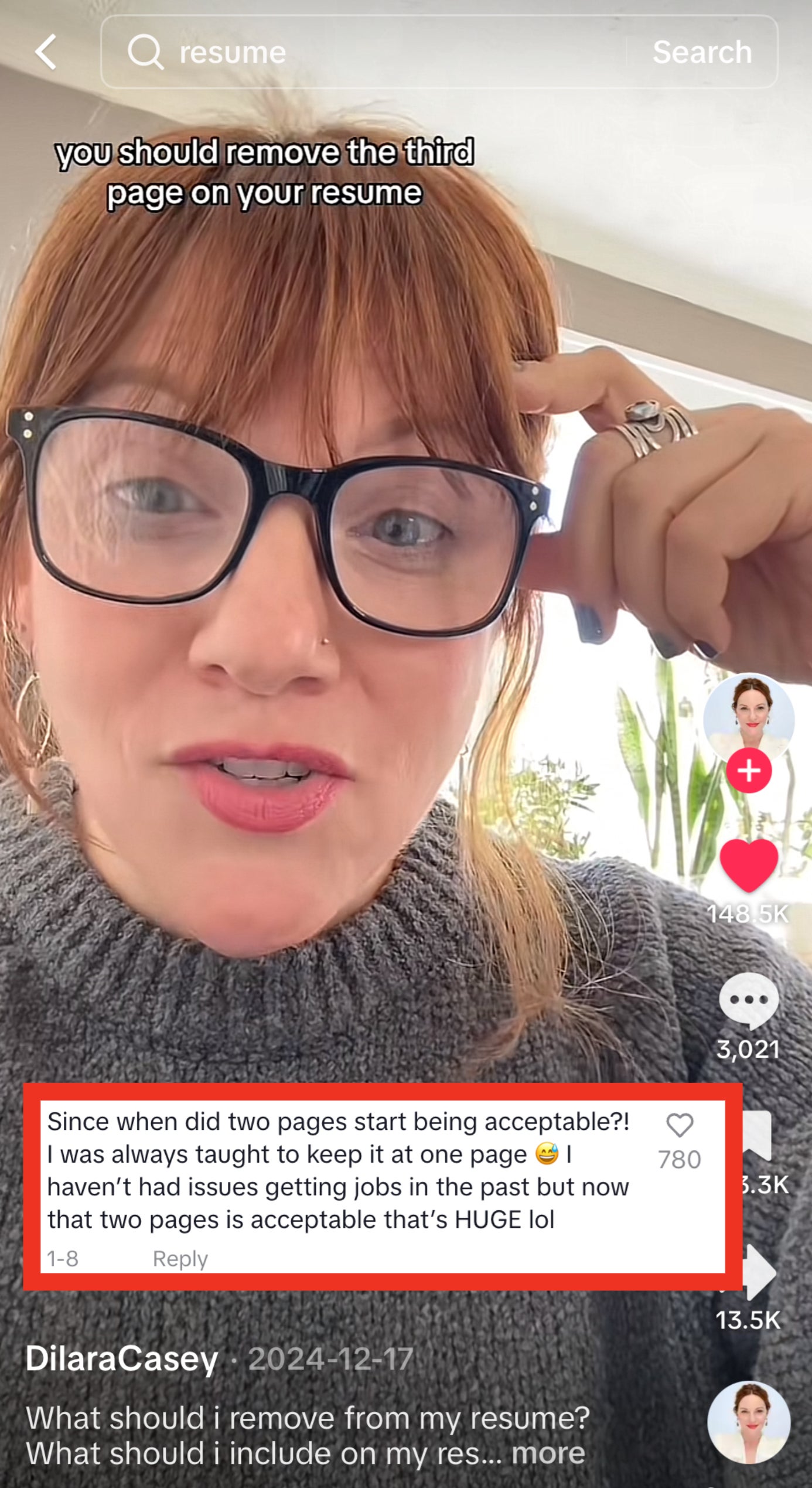If you've ever felt like writing your résumé was a covert form of corporate torture straight out of Severance, same. But whether we like it or not, it's something many of us have to do if we want to get a job and take home a paycheck. Recently, résumé writer Dilara Casey (@totally_employable) has been going viral for sharing 10 things to leave off your résumé in 2025, and it's a great refresher on what this incredibly important document should look like.
Here are the 10 things that she says have no business being on your résumé any more:
1. First of all, Dilara says, "I've seen this recently. It's kind of weird, but don't put your salary on your résumé."
Having your salary listed on your résumé could cost you when it comes time to negotiate. A company could easily lowball you on salary, especially if you're already underpaid. Keep your salary to yourself, and always let the company say the first number in negotiations.
2. Next, you can delete the line that says "references available upon request."

3. Or if you have a list of your references on your résumé, it's time to let it go.
According to Dilara, "The people that are listed as a reference, they probably know you're listed as a reference, but they could call them willy nilly, and you wouldn't even know. They wouldn't have a heads-up. It'd be really weird and awkward. And also, you're wasting precious real estate on your resume."
4. This one was a little controversial in the comments, but Dilara advises against including color on your résumé for a couple of different reasons.

5. If you have the URL for your LinkedIn profile on your résumé, Dilara says it's time to replace it with a hyperlink.
"Your LinkedIn link might be kind of jumbly and kind of just weird. So just like, streamline it, clean it up. Make it a hyperlink."
6. Next, you can stop putting your full home address on your résumé.

7. If you have a graph that's meant to illustrate your skills, it might be doing your résumé more harm than good.
She explains, "They're super subjective. And also, it's a graphic, so it could, like, gunk up in the ATS. And also, it's just a waste of space. If you're really good at something, to highlight that just put, like, 'I'm really great at the CRM.' Don't put CRM and put a little bar to show how good you are at it."
8. Repeated and redundant words are another big no-no.

9. Next, she says, "People hate when I tell them to remove this. They really hate it. It's actually pretty painful: old, expired certificates."
If you have a certificate that's not up to date, it's not doing you any favors on your résumé — especially if it's not particularly relevant to the new roles you're applying for now.
10. Last but not least, Dilara says that if your résumé has a third page, it needs to go.

And in the comments, others who work in HR and hiring shared a few more things to avoid:

For example, #Don'tDoThis:

Another thing to avoid including is the year you graduated, since that can give potential employers a chance to discriminate against you.

And ditto on including your photo on your résumé (unless you work in a field where this is normal and expected).

Phew, that was a lot of "don't"s. Luckily, Dilara also shared three helpful "do"s:
1. Add "anchoring statements" to your work experience.

2. Include a short summary.
"The key here is SHORT. Think back to the early days of Twitter when you had 140 characters to get your point across. That is what people are looking for when you write a summary these days. Long paragraphs take up precious real estate on your résumé and will not hold your reader's attention."
3. Make sure you're listing only your most relevant skills.

Finally, she shared some advice for job seekers in today's competitive market. "If you are a job seeker, you will get bombarded with advice. Only follow advice from people you respect and who are in roles where you want to be."
And if you're interested in hiring a résumé writer to help you through the tedious and anxiety-provoking process, she has some hints there, too. "If you’re looking for a résumé writer, ask for references or samples. You need to make sure that they fit your budget, but also that they fit your needs. There are plenty of people out there who are charging $1,000 to write a résumé, and they are awful. I know this because I spend about 25% of my time fixing their mistakes. They maybe had one job at a company 10 years ago and became a resume writer. They do not have their finger on the pulse of today’s environment and they’re playing by antiquated rules."
"Right now, searching for a job is also highly emotional, and I get that too. So make sure, if you seek support on your résumé, that it is somebody who can empathize. In my case, I’ve been laid off before. I’ve been overlooked for a promotion. I’ve left companies because of a toxic environment. I’ve had to take time off work for health reasons and claw my way back to my level. I’ve also landed a new job in today’s market. So I understand the emotional piece, and I see that as a bigger factor with my clients now than even just a few years ago."
